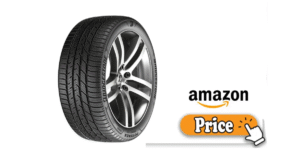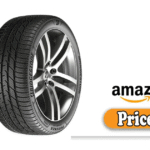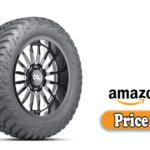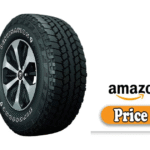When people shop for new tires, they usually focus on price, size, and performance. But one question often gets overlooked: Who makes Bridgestone tires? This isn’t just a matter of curiosity; it’s about trust, quality, and understanding what goes into the rubber that connects your vehicle to the road.
Bridgestone is one of the most recognizable tire brands in the world, but behind the logo is a fascinating history, global operations, and a design philosophy that has shaped modern tire technology.
This article will take you on a 360‑degree journey through Bridgestone, covering what I like about the brand, where it could improve, my hands‑on experience, the design philosophy, performance, and build quality.
I’ll even share an alternative option worth considering before wrapping it all up with final thoughts. And for those of you in a hurry, the short answer is: Bridgestone tires are made by Bridgestone Corporation, a Japanese multinational founded in 1931 by Shojiro Ishibashi.
Today, the company operates more than 120 production facilities worldwide. So, let’s dig in deeper and see what makes Bridgestone a household name in the tire industry.
What I Like
There are many reasons Bridgestone is the world’s largest tire manufacturer. Here are a few standouts:
- Global Reputation and Trust
Bridgestone’s name carries weight. Whether you’re in the U.S., Europe, or Asia, mechanics and car enthusiasts recognize Bridgestone as a premium brand. - Wide Product Line
From everyday passenger tires to ultra-high-performance racing rubber, Bridgestone has something for everyone. The Blizzak series dominates in winter performance, while the Potenza line is engineered for speed enthusiasts. - Commitment to Innovation
The company invests heavily in R&D, developing eco‑friendly solutions like the Ecopia line, designed to reduce rolling resistance and improve fuel economy. - Sustainability Initiatives
Bridgestone has committed to carbon neutrality and renewable resources. They’ve introduced advanced compounds, smart tire technology, and plant‑based materials in some products. - Strong OEM Partnerships
Brands like Ferrari, Lamborghini, and major EV manufacturers rely on Bridgestone for original equipment (OE) tires. That speaks volumes about trust at the highest level.
What Could Be Better
No company is perfect, and Bridgestone is no exception.
- Pricing
Bridgestone tires often cost more than competitors like Hankook or Kumho. While quality justifies the price, budget‑conscious buyers may hesitate. - Workforce Reductions
In recent years, some plants have shut down or reduced operations, leading to layoffs. While this is part of business optimization, it can impact local economies and sometimes availability. - Regional Availability
Although Bridgestone is global, certain specialty tires are not always easy to find in smaller markets or rural areas. - Performance vs. Comfort Trade‑Offs
Some of their performance‑oriented tires, while excellent in grip, may ride more stiffly than competitors.
 👉🏿👉🏻 Check The Latest Price and Offer at Amazon 👈🏻👈🏿
👉🏿👉🏻 Check The Latest Price and Offer at Amazon 👈🏻👈🏿
My Personal Experience
I’ve had the chance to drive on several Bridgestone models over the years, and my impressions have generally been positive.
- Blizzak WS90 (Winter Tire): These transformed my winter driving. I live in an area with heavy snowfall, and the traction was superb. Stopping distances on ice were shorter compared to my old Michelin X‑Ice tires.
- Potenza RE980AS+ (All‑Season Performance): I put these on a sports sedan, and the cornering grip was phenomenal. Road noise was slightly higher, but I expected that given the tread pattern.
- Turanza QuietTrack (Touring Tire): These were the quietest tires I’ve owned. Long highway drives felt effortless, with reduced cabin noise and great wet‑road confidence.
Overall, my experience lines up with Bridgestone’s reputation: premium performance, strong durability, and innovation that you can feel on the road.
Design
Bridgestone’s design philosophy is a blend of heritage and cutting‑edge innovation.
- Origins: Founded in Kurume, Japan, in 1931 by Shojiro Ishibashi. The name “Bridgestone” is a translation of his surname (“Ishibashi” means “stone bridge”).
- Acquisitions: In 1988, Bridgestone acquired Firestone, instantly becoming a powerhouse in the U.S. market.
- Modern Innovations: The company now leverages AI, 3D virtual modeling, and sustainable materials to design tires. Their Enliten technology platform focuses on reduced weight and improved energy efficiency.
- Aesthetic Design: Beyond performance, Bridgestone ensures tread patterns not only perform but also look modern and dynamic.
Performance
Performance varies by product line, but across the board, Bridgestone shines:
- Blizzak (Winter): Superior snow and ice grip. Industry leader for decades.
- Potenza (Performance): Designed for high‑speed stability, sharp handling, and cornering confidence.
- Ecopia (Eco): Reduces rolling resistance, improving fuel economy and lowering CO₂ emissions.
- Dueler (SUV/Truck): Balances off‑road toughness with on‑road comfort.
- Turanza (Touring): Built for long‑distance comfort and quiet rides.
Their history in motorsports (including Formula 1 and endurance racing) shows how performance innovations trickle down to consumer products.
Build Quality
Bridgestone’s build quality is second to none.
- Global Footprint: With over 120 production facilities in more than 24 countries, Bridgestone ensures local supply and global standards.
- Quality Standards: They were one of the first tire makers to win the Deming Prize for quality control. That emphasis remains today.
- Materials: Advanced compounds and reinforced sidewalls enhance durability. Run‑flat tire technology is another area where Bridgestone leads.
- Traceability: Every tire has DOT plant codes, making it easy to track its origin and manufacturing plant.
Alternative Option
While Bridgestone is outstanding, it’s wise to compare.
- Michelin: Known for consistent quality, strong warranties, and innovations like the CrossClimate series.
- Goodyear: Offers competitive pricing and a wide network of service centers in North America.
- Continental: Strong in safety features, especially wet braking performance.
If price is a factor, Michelin is Bridgestone’s closest competitor in terms of premium quality. For budget buyers, Hankook or Kumho can provide decent performance at lower prices.
Final Thought
So, who makes Bridgestone tires? The answer is both simple and inspiring: Bridgestone Corporation, a Japanese multinational founded in 1931, now operating across the globe. But more than just a company name, Bridgestone represents a tradition of quality, innovation, and relentless pursuit of performance.
From snowy backroads with Blizzaks to race tracks with Potenzas, Bridgestone has built a legacy that speaks through every tire. While pricing may run higher, and availability in certain areas could improve, the reliability and performance often make it worth the investment.
If you’re shopping for tires that blend history, design excellence, and future‑ready sustainability, Bridgestone should be on your shortlist.
Read More: Nexen Tires Price
FAQs: Who Makes Bridgestone Tires | My Honest Experience
Q1: Who makes Bridgestone tires?
Bridgestone Corporation, a Japanese multinational founded by Shojiro Ishibashi in 1931.
Q2: Where are Bridgestone tires manufactured?
In more than 120 facilities across 24+ countries, including Japan, the U.S., and Europe.
Q3: Are Bridgestone tires better than Michelin?
Both are premium brands. Michelin often emphasizes longevity and comfort, while Bridgestone is praised for innovation and diverse performance lines.
Q4: Are Bridgestone tires expensive?
Yes, they generally cost more than budget brands, but the price reflects quality and performance.
Q5: Do Bridgestone tires last long?
Yes. With proper maintenance, they typically last as long as or longer than many competitors.
Q6: Is Firestone the same as Bridgestone?
Firestone is owned by Bridgestone but operates as a distinct brand with its tire lineup.




